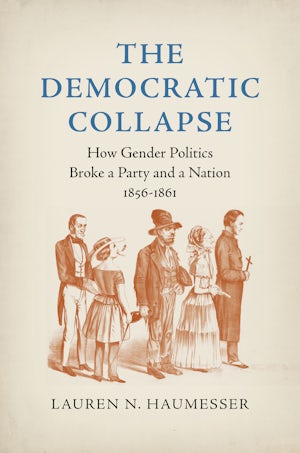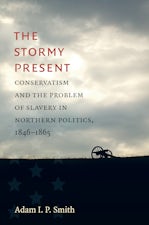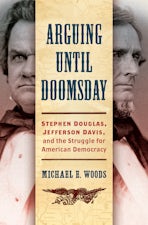The Democratic Collapse
How Gender Politics Broke a Party and a Nation, 1856-1861
By Lauren N. Haumesser
230 pp., 6.125 x 9.25, 7 halftones, notes, bibl., index
-
Paperback ISBN: 978-1-4696-7143-7
Published: November 2022 -
Hardcover ISBN: 978-1-4696-7142-0
Published: November 2022 -
E-book EPUB ISBN: 978-1-4696-7144-4
Published: October 2022 -
E-book PDF ISBN: 979-8-8908-5544-2
Published: October 2022
Civil War America
Buy this Book
- Paperback $27.95
- Hardcover $99.00
- E-Book $22.99
For Professors:
Free E-Exam Copies
Lauren Haumesser here traces how northern and southern Democrats and their partisan media organs used gender to make powerful arguments about slavery as the sectional crisis grew, from the emergence of the Republican Party to secession. Gendered charges and countercharges turned slavery into an intractable cultural debate, raising the stakes of every dispute and making compromise ever more elusive.
About the Author
Lauren N. Haumesser holds a Ph.D. in History from the University of Virginia.
For more information about Lauren N. Haumesser, visit
the
Author
Page.
Reviews
“Engaging and succinct . . . shed[s] new light on the coming of the Civil War through a careful examination of the gendered rhetoric of Republicans, Democrats, and, ultimately, Constitutional Unionists.”—Civil War Book Review
“Haumesser’s excellent book is a welcome addition to antebellum political history and gender studies . . . [and] should be a standard volume of political and gender history that appears alongside classic books like David Potter’s The Impending Crisis.”—Civil War Monitor
"The 1860 presidential campaign was conducted in heavily gendered terms. Haumesser shows this was not a sudden, exaggerated reaction by Democrats to the threat of a Republican president. Instead, all of the purple prose and over-the-top political cartoons depicting Lincoln as a tool of feminists and abolitionists emerged from rifts within the Democratic Party during the sectional crisis."—Judith Giesberg, Villanova University
"Crisply and engagingly written, Haumesser's social and political history shows how gender mattered in Civil War–era politics, proving that the very pervasive gendered rhetoric that mobilized Democrats in one election proved their undoing in another."—Aaron Sheehan-Dean, Louisiana State University




